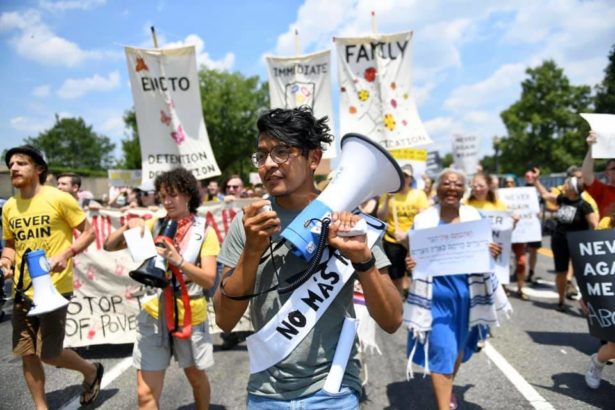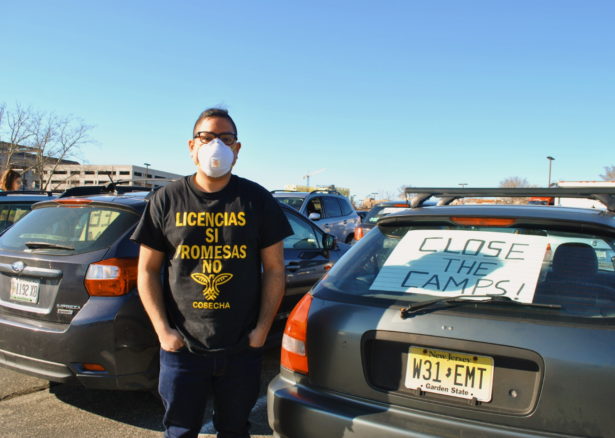A procession of 60 cars honking their horns and brandishing signs proclaiming “Free Them All” circled Bergen County Jail in Hackensack, New Jersey on March 27. A prisoner and guard in the jail had just tested positive for COVID-19, and the protesters were demanding that all nonviolent incarcerated people and ICE detainees be released in order to stop the spread of the virus and save thousands of lives.
The protesters called it a “drive-by protest.” Since late March, similar actions involving hundreds of cars have taken place in other states as well, including Louisiana, Illinois and North Carolina. The protests are just one of the many creative tactics that organizers have been employing to show solidarity with the immigrant community while social distancing.
Ambien Mitchell is an activist and educator working at New Sanctuary Coalition, a clinic that provides legal and emotional support for people navigating the immigration system. In her view, it has never been more critical to advocate for humane policy and demand accountability for those in power.
“We’re living in a system of state violence, with decades of experience perpetuating incredible cruelty on vulnerable populations,” Mitchell said. “The state has already proven to have a blatant disregard for human life. And they’ve already proven that they believe some lives are less valuable than others.”
“Every prison and every detention center is like a cruise ship that’s not allowed to dock.”
Although the entire nation is grappling with the COVID-19 pandemic and its consquences, the undocumented community has been facing unique — and often overlooked — struggles. Those imprisoned in detention centers are kept in close quarters where social distancing is impossible. Economic relief plans such as the CARES Act neglect undocumented people altogether, though many undocumented workers are providing essential labor during this crisis and most undocumented people pay taxes. Meanwhile, despite the federal government’s own admission that the best thing that can be done to flatten the curve is to limit travel, deportations and ICE raids are still taking place.
“It’s no secret that the undocumented community has been targeted and criminalized for decades,” said undocumented organizer Li Adorno, who works with the New Jersey chapter of the immigrant rights group Movimiento Cosecha. “Even in a crisis, the undocumented community is still being targeted. We’re always the ones that the government forgets about.”
‘Free them all’
Kathy O’Leary is the region coordinator for New Jersey at Pax Christi USA, a national Catholic peace and justice organization. In the past, she has helped compile reports on the desperate conditions plaguing New Jersey jails. Since the quarantine began, O’Leary has been pouring her energy into the fight for ICE detainees and prisoners to be released. In addition to organizing drive-by protests of detention centers in New Jersey, she’s also helped draft a petition calling on Gov. Phil Murphy to use his emergency powers to take action.
“On a good day, getting access to health care when you’re in prison is completely at the mercy of the administration,” O’Leary said. “And a jail is not a sealed environment. Even though they cut off visitation, the guards still rotate three times a day and then go home to their families. The guards could very easily bring the virus back to the jail without knowing it — and if there is an outbreak in the jail, then that gets brought back to the community.”
The petition is backed by over 30 social justice and immigrant rights organizations with chapters in New Jersey, including the Jewish Coalition for Refugees, the Sunrise Movement and Cosecha.
“Even if all the petition does is elevate the issue — that’s important too,” O’Leary said. She considers the petition an opportunity to stand with incarcerated people across New Jersey who are going on hunger strike, demanding access to essentials like gloves, masks, soap and hand sanitizer. Skipping even a single meal in the dining hall of a detention center comes with the risk of being thrown in solitary confinement.
Holding ICE accountable for their failures
According to Ambien Mitchell of New Sanctuary Coalition, phone calls are another simple and remote option when it comes to advocating for undocumented people during the crisis. She suggests calling elected representatives because they can pressure ICE, as well as calling ICE field agents and detention centers themselves.
“Every prison and every detention center is like a cruise ship that’s not allowed to dock,” Mitchell said. “And at this point, inaction has become an incredibly brutal and violent action. These aren’t fun conversations, but they’re conversations that are worth having — ICE is a federal agency, and we do pay their salaries with our tax dollars.”
Previous Coverage
 How undocumented activists in New Jersey won driver’s licenses for all
How undocumented activists in New Jersey won driver’s licenses for allAdorno believes that ICE’s unwillingness to cease operations is not only putting detainees at risk, but the community at large. “Even during the pandemic, ICE continues to hunt down undocumented community members,” Adorno said. “In the past, ICE has claimed they would not go to school zones and courts — but then went against their own memos. That’s why the immigrant and undocumented community has very little faith in the local or federal government.”
The impact of this mistrust is that even if they are experiencing symptoms, many undocumented people may hesitate to go to a hospital, despite ICE’s claim that they will not be arresting people who are seeking medical care.
“Undocumented people don’t have health insurance, and they’re afraid to seek care at hospitals because ICE might go there,” Adorno said. “If you only have one member of the family who is working right now, and they get arrested, how is that going to impact the rest of their family?”
Campaigns for commissary and worker relief
First Friends is an organization of people who visit detained immigrants and asylum seekers in New York and New Jersey. Because of the crisis, their volunteers can no longer visit detention centers — so the organization has started a Gofundme to raise commissary money. Often, detainees can’t afford to buy the basics due to marked up prices and meager salaries that border on slave wages.
“Commissary can be used to help incarcerated people feel a little more comfortable during this stressful time,” O’Leary said. “Buying an extra pack of ramen noodles or a candy bar can make them feel more human. But there are other things in there too — like soap and shampoo.”
She noted that while inmates in places like New York are being used to produce thousands of gallons of hand sanitizer for less than a dollar an hour, they are not allowed to purchase sanitizer themselves because of the alcohol content. O’Leary also added that in addition to buying hygiene products, the crowdfunded commissary can also be used for phone calls to family, lawyers and friends — crucial connections to the outside world in a time when many inmates are lonelier and more isolated than ever.
Also organizing to respond to financial need is Cosecha, a coalition of undocumented people and allies who have previously won fights like driver’s licenses for all in New Jersey. “Undocumented communities have always joined together to surpass tough times like this,” Adorno said, who is currently quarantined with Cosecha members and developing strategies for relief. “In our home countries, we don’t have a lot of help. The mutual aid we’re seeing rise up — this is the kind of thing that the undocumented community thrives at. We’re good at this because we’ve had to do it in the past. Nobody else is going to come rescue us.”

Because of their legal status, undocumented workers don’t have access to necessities like health insurance, paid sick leave, unemployment and other forms of government relief. In order to help ease the burden, Cosecha has started a fund to help families with needs like food, rent and utilities during the crisis.
“You can’t feed a movement with service,” Adorno said. “You have to feed a movement by bringing people together. This fund has to be accompanied by organizing efforts. Otherwise it’s going to be really hard to sustain it.”
Since the pandemic, Cosecha has begun training organizers through video conferences — and shifted its focus towards pushing for economic measures that will elevate undocumented and working class people, like popularizing the idea of a rent strike.
The future of the immigrant rights movement
COVID-19 is a health crisis of epic proportions, and its effects on the undocumented community have been devastating in ways that most Americans will never experience. At the same time, the pandemic has produced opportunities to mobilize and opened the door to conversations about issues critical to the immigrant community, like prison and detention reform, raising the minimum wage and making healthcare accessible to all.
“It’s amazing the resources that come together when you’re at home and not devoting all your time to capitalist pursuits,” O’Leary said, referring to the coalitions that have come together to demand justice for themselves, their communities and people they’ve never met. “It’s really heartwarming to see that light in the darkness.”
For Adorno and organizers with Cosecha, the pandemic also presents an opportunity. Never before has the well-being of our country’s general populace been so visibly dependent on the well-being and liberation of the undocumented community. Nearly 30,000 DACA recipients are currently serving on the front lines in healthcare professions. And as farm workers on both sides of the border risk their lives to keep grocery stores stocked, it has never been more clear that undocumented people provide essential contributions to our country — a reality that can be leveraged for strikes and labor campaigns in the future.
As the number of people infected with the virus swells into the hundreds of thousands, it’s hard to deny that we are more connected than we are taught to believe. This is a realization that has the potential to bolster movements by radicalizing more people than ever before.
“What ICE and our administration is doing is putting a price on individual human life,” Mitchell said. “But what makes it even more frightening and sinister in this present moment is that we see how individual human life is so beautifully and closely related with communal human life.”
